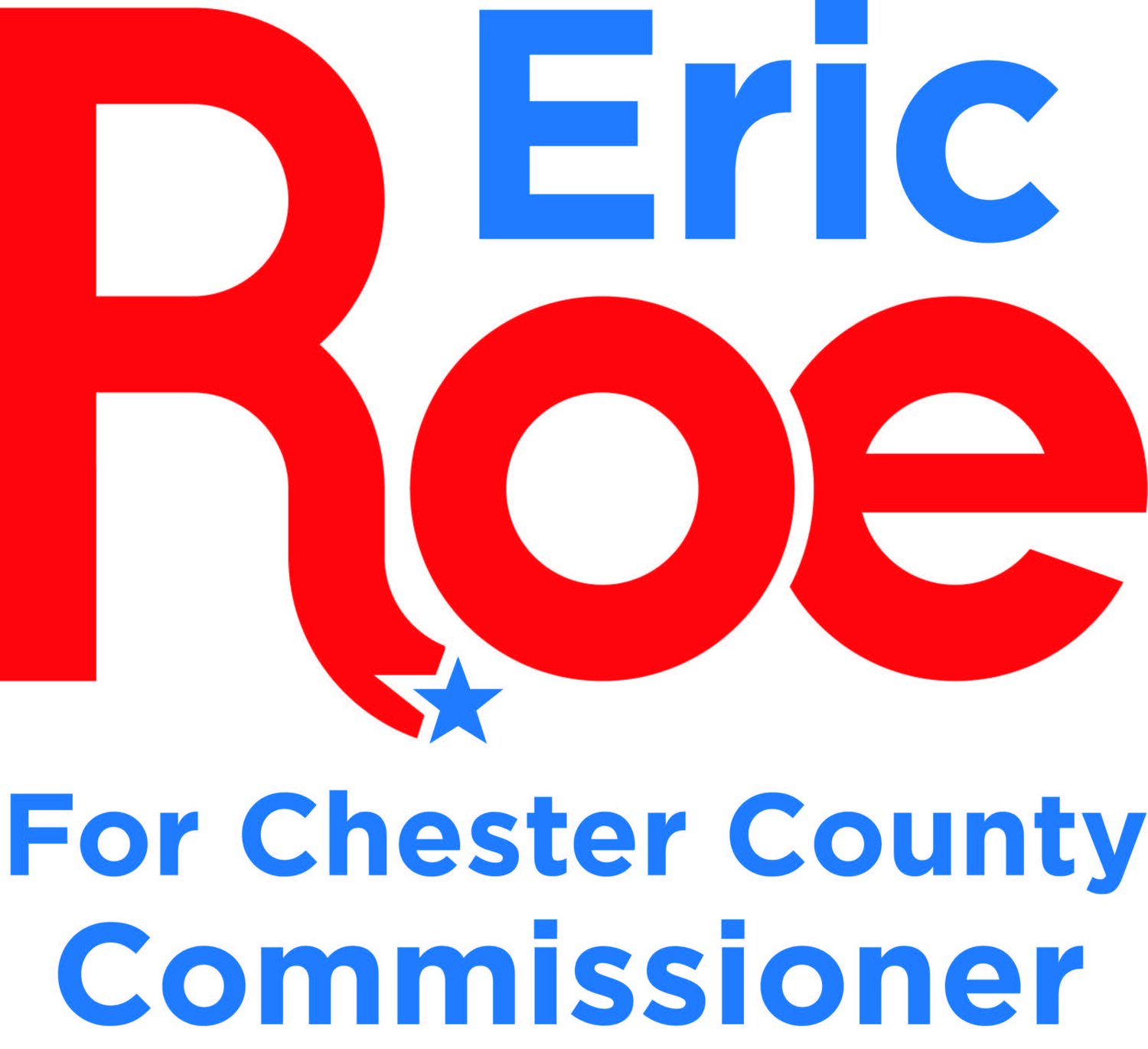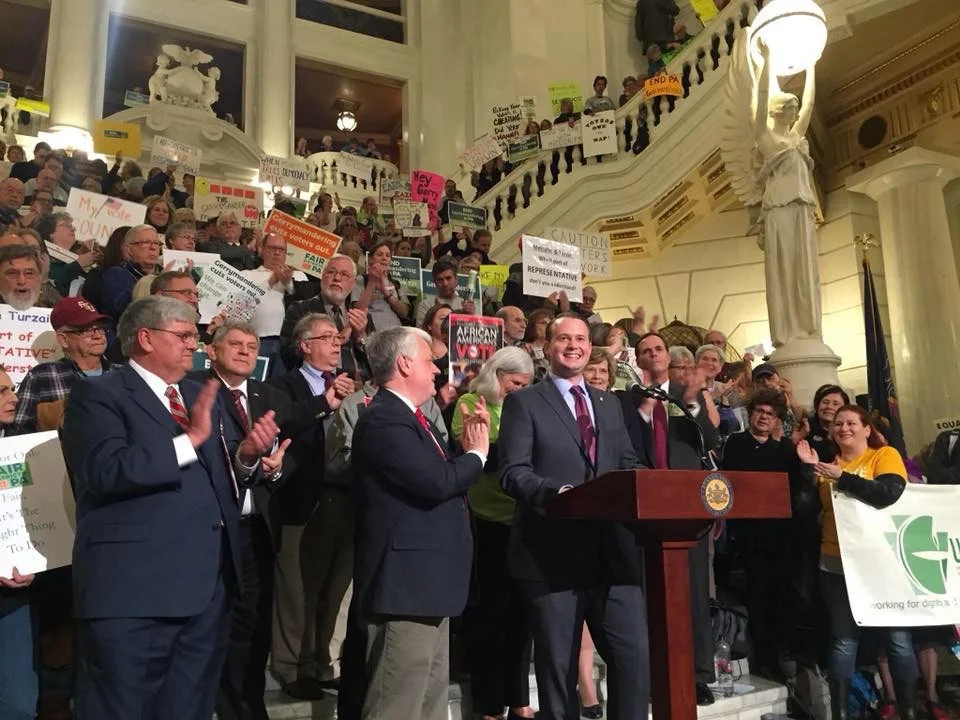By Richard L. Gaw
Staff Writer
On Sept. 26, Eric Roe, a little more than one month before a Nov. 6 election that will determine whether he will return to Harrisburg for his second term as the Representative for the 158th District, accepted the invitation of a local resident to meet with him at Philter in Kennett Square.
As the usual clientele blended with each other in the cozy confines of the cafe, Roe, a Republican, listened intently while the man asked about issues that were of importance to him. The man had done the exact thing, one table over at Philter, two days before, when he invited Roe's opponent, Democrat Christine Sappey, to answer his questions. Roe listened before speaking and paused before answering.
In the race for his young political life, campaigning in the quagmire of a national political climate that's buried policy under an avalanche of corruption and indecency, Roe listens to every voter, because these days, he can't afford not to.
A month away from the election, Roe's campaign quietly soldiers on in a groundswell of criticism from his opponent, a growing sentiment that believes that Harrisburg is permanently broken, and a much-talked-about prognostication that any Republican campaigning for office this November – at the top of the ballot or near the bottom – is prepared for the anti-Trump tsunami that could turn states, regions and districts a rich shade of blue.
Roe spoke about the man he had met at Philter.
“I am lucky to represent a district that is extremely well educated, and you would be surprised by how many of them are willing to educate themselves about the details of my individual stances, and are willing to see past party when they go to vote,” he said. “There are lot of people in this district who are unwilling to put their elected officials into two different boxes and categorize the world that way. The world is a much more complex place than that. It's not as tribal as people make it out to be. People aren't red or blue. They're variations of purple.”
While the winds whip heavy around him, Roe remains calm in the storm, and it's likely due in part to the accomplishments that dot his campaign literature and form the bedrock of his campaign for re-election. He was on the right side of a lot of legislature in the Pennsylvania House in the last two years: He voted for $60 million in grants to make Pennsylvania schools safer; co-sponsored anti-violence legislation that toughened firearms laws; voted to give more than $11 billion to public schools in the state; helped reform the state's employee pension system; and along the way, turned his attention closer to home, by appearing at 15 town halls in his district that dealt with issues as far ranging as property/school taxes, school violence and the elimination of gerrymandering in Pennsylvania.
In fact, it was gerrymandering – seen in his co-authoring of House Bill 722 with Democrat Steve Samuelson – that would amend the Pennsylvania Constitution to establish an independent citizens commission to redistrict Congressional as well as State House and Senate districts.
While it has earned the praise of anti-gerrymandering groups such as Fair Districts PA, it's currently stalled. In order for it to be passed, the bill needs to get approval from both the House and Senate, first in a single session and again in the next session, and then be ratified by citizens in a ballot referendum vote.
“Some people will probably use this particular bill to ask why I couldn't get this done,” Roe said. “My answer is that I think the trademark of a good legislator is someone who sets very lofty goals and doesn't settle for just the easy bills to pass. We knew we were climbing Mt. Everest, but it's worth pushing for, all the town halls I held about this issue.”
Serving on the front lines in state government has allowed Roe to both learn and impact the way Harrisburg works, a session-by-session making of the sausage that he said defies the popular belief that it's a broken system.
“It's not as divided personally as people might think,” he said. “I have good friends in the Philadelphia delegation who are a lot more liberal, but we have a friendly relationship. Here we have the most liberal governor in America, and one of the most conservative legislatures in America, and yet we still got historic pension reform passed. We invested more in schools than has ever been done before. We passed animal cruelty legislation, and the list goes on and on.
“Two years ago, my opponent made me out to be to the right of Attila the Hun, and I'm sure this year, my opponent will try to do the same thing, but at least there is proof that I am more of a centrist than what others try to make me out to be.”
In her campaign literature, Sappey states that Roe is “threatening women's health” by voting to restrict women's rights, including an extreme ban on abortions. Roe voted for Senate Bill 3, which would amend Pennsylvania’s current Abortion Control Act to change the current 24-week cutoff for abortions to 20 weeks except in cases of medical emergency, with no exception for rape and incest. Further, the bill would make a medically accepted technique called “dilation and evacuation” illegal and penalize doctors for performing it.
The bill passed in the Pennsylvania Senate by a vote of 32-18 and now sits on Gov. Wolf's desk. Wolf, a Democrat, has vowed to veto any bill that seeks to limit access to abortion. Roe, who is pro-life, said that the vote came at a precious time in his life, when he and his wife Alice found out they were to be the parents of twin boys.
“I got to see how far along they had developed, and I got to see their beating hearts and kicking in the womb,” he said. “I put my hand up to my wife's skin and I could feel tiny, little kicks in there. These were human beings and had human rights already, and they had constitutional rights, in my opinion.
Love doesn't count chromosomes, and we shouldn't either.”
Sappey has also criticized Roe for his association with two groups that have far-right ideals. In the summer of 2012, Roe worked at the American Conservative Union, but left after only three months on the job, for what he calls “personal reasons.” On Dec. 17, 2017, he was in attendance at the Faith & Freedom Coalition of Pennsylvania's annual Legislative Day in Harrisburg.
“I welcome a diversity of opinions, and I'm happy to take any invitation from any group, and tell them where I stand,” he said. “Faith informs people's opinions. It informs political persuasions, and I don't think that it precludes anyone from being involved in the political process.”
Roe's opponent in this election is not just Sappey. It's groups like PADems, TurnPABlue, and Planned Parenthood Pennsylvania, which are endorsing Sappey and other Democrats throughout the state. While he is not oblivious that there will be voters who will vote “D” merely as a referendum of anger on Trump, Roe said that his voting record, personal and political beliefs and actions are his, and his alone
“The only person who gets to decide who I am is me,” he said. “The only person who gets to decide what agenda I'm pushing is me. The only person who gets to decide what issues I'm willing to legislate for is me. The voters who are paying attention have already seen that.”
A few weeks ago, during a door-to-door campaign swing through Bradford Township, Roe spoke to a voter at her doorstep. Minutes after leaving her property, the woman caught up to him down the block, and told Roe that despite the fact that she is a Republican, she did not vote for him in the 2016 election. She was influenced by the campaign literature of his opponent, she said. “Since then,” she told him, '” have seen that you are actually an independent voice, and that you speak your mind, no matter who likes it.”
“She wanted to thank me for being a voice of reason, in an otherwise difficult time to find people,” Roe said. “Some people will try to make it out that all politics are national, and I'm doing my very best to show people that no, all politics are, in fact, still local. The person at the bottom of the ballot has more influence on a person's everyday life than the person at the top.
“That's been my aim for the last two years – to serve people on a local level – and I hope that they can see and appreciate that.”

